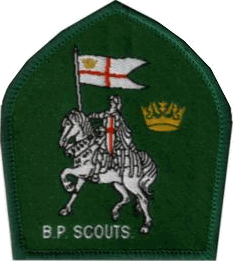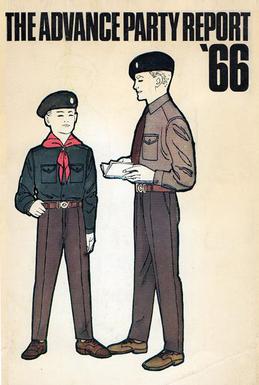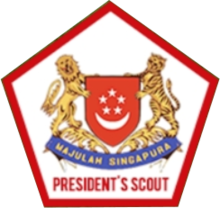
The Boys' Brigade (BB) is an international interdenominational Christian youth organisation, conceived by the Scottish businessman Sir William Alexander Smith to combine drill and fun activities with Christian values. Following its inception in Glasgow in 1883 the BB quickly spread across the United Kingdom, becoming a worldwide organisation by the early 1890s. As of 2018, the Boys' Brigade claimed 750,000 members in 60 countries.

The Baden-Powell Scouts' Association (B-PSA) is a worldwide youth organisation originating in the United Kingdom, with friendly relationships with similar traditional scouting organisations in various countries. Baden-Powell Scouting focuses on the importance of tradition in the scout movement.

Cub Scouts, Cubs or Wolf Cubs are programs associated with Scouting for young children usually between 7 and 12, depending on the organization to which they belong. A participant in the program is called a Cub. A group of Cubs is called a 'Pack'.

The Scout Association is the largest Scouting organisation in the United Kingdom and is the World Organization of the Scout Movement's recognised member for the United Kingdom. Following the origin of Scouting in 1907, the association was formed in 1910 and incorporated in 1912 by a royal charter under its previous name of The Boy Scouts Association.

Malaysian Scouts Association is the largest informal youth and educational organisation in Malaysia, and member of World Organization of the Scout Movement (WOSM).

A King's Scout is a Scout who has attained the King's Scout Award. The King's Scout Award is the highest youth award achievable in the Scouting movement in the Commonwealth realms, including the United Kingdom, Canada, Australia, and New Zealand, where Scouts operate under the patronage of King Charles III. Whether the award recipient is a Queen's or King's Scout depends on who is the current monarch of the Commonwealth realms.
Scouts South Africa is the World Organization of the Scout Movement (WOSM) recognised Scout association in South Africa. Scouting began in the United Kingdom in 1907 through the efforts of Robert Baden-Powell and rapidly spread to South Africa, with the first Scout troops appearing in 1908. South Africa has contributed many traditions and symbols to World Scouting.
Venturer or Venture Scouts are programs in some Scouting organisations for young people of various age ranges in the 14–20 age range. A participant in the program is called a Venturer.

Rover Scouts, Rovers, Rover Scouting or Rovering is a program associated with some Scouting organizations for adult men and women. A group of Rovers is called a 'Rover Crew'.

A Scout leader or Scouter generally refers to the trained adult leader of a Scout unit. The terms used vary from country to country, over time, and with the type of unit.
Joey Scouts is the section of Scouts Australia for boys and girls aged 5 to 7 (inclusive), often known simply as 'Joeys'. The Joey Scout section is the first age section in the Australian Scout Movement and comes before Cub Scouts. Joey Scouts wear a uniform shirt with navy blue panels, and tawny shoulders.

The Pathfinder & Rover Explorer Scouts' Association (P-RESA) is an independent Traditional Scouting Association in the United Kingdom, with International branches. The Association's training programme runs along the lines of Baden-Powell's original Scouting for Boys, upholding the traditions and practices set out by B-P, using the 1938 Boy Scouts' Association Policy Organisation & Rules (POR) as its basis.
Cub Scouts is the section of Scouts Australia for boys and girls aged 8 to 11 (inclusive), often known simply as 'Cubs'. The Cub Scout section follows after Joey Scouts and is before Scouts. Cub Scouts wear a uniform shirt with navy blue panels, and yellow shoulders.
Scouts is the section of Scouts Australia for boys and girls aged 11 to 14 (inclusive). The Scout section follows after Cub Scouts and is before Venturer Scouts. Scouts wear a uniform shirt with navy blue panels, and green shoulders.

Senior Scouts or Seniors is a section of the Baden-Powell Scouts' Association for 14- to 18-year-olds. The aim of the section is to provide a flexible and active Scouting programme for adolescents, with an emphasis on personal challenge and adventure. Members of this section wear maroon berets and shoulder tabs.

The Baden-Powell Award, also known as the B-P Award or Baden-Powell Scout Award (BPSA), is the highest award achievable to Rover (adult) Scouts.

The St. George's Award is the highest youth award achievable in the Senior Scouts section of the Baden-Powell Scouts' Association.

The Boy Scouts Association's The Chief Scout's Advance Party Report 1966 attempted to address the association's falling enrollment numbers and modernise its programs. It resulted in changes to traditional iconic uniforms, changes to awards, training schemes, the association's name and other nomenclature, reduced distinctions between Cubs and Scouts and discontinuation of Rovers. However, the changes failed to halt decline in older enrolments, resulting in a shift to younger ages and also resulted in disaffection, a schism in the organisation, growth of the alternate British Boy Scouts and European Scout Federation, formation of independent Scout groups and further alternate Scout organisations, particularly the Traditional Scouting Baden-Powell Scouts' Association and helped to re-establish understanding of Scouts as a movement rather than a single organisation.

The People's Republic of China now has multiple and originally separate Scouting activities within its borders. The newly founded Scout Association of the People's Republic of China (中华人民共和国童军总会) serves Rover Scouts and Venture Scouts 15 years old and above in both genders. Registered units of this association are the Shanghai Scout, Rover Alpha Fujian Crew, Guangdong Rover, Rover "A" Jiangsu Crew. Scouts of this association took part in Jamboree on the Air and Jamboree on the Internet 2009 and the association issued several memorabilia for these events. In close connection with the Scout Association of the People's Republic of China is the Team Delta Rovers (中国三角洲成人童军队).

Baden-Powell's Scout training scheme was a progressive series of tests for Boy Scouts, in skills which the founder of the Scout Movement believed would be useful in building character and good citizenship.















